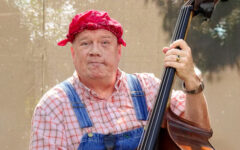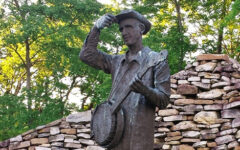
There’s a tradition here of publishing at least one bluegrass haiku column per year. I’ve usually taken presidential election years off because even short-form poetry about leaves and clouds is controversial and divisive in these years (“Is that a reference to chem trails?” “Are you trying to make a subtle statement about climate change?”). However, I’m going to take a chance and do it anyway because after all, there’s no left, right, red, or blue in haiku. There isn’t even punctuation, and we all know how divisive that can be if you’ve ever met a really opinionated semi-colon.
Just as a reminder, while modern haiku can have a flexible syllable count, the more traditional form (the kind that also shuns electric bass) adheres to the three lines of five, seven, and five syllables in that order.
Example:
playing the banjo
while the breeze blows through my hair
even though I’m bald
Also, a haiku must contain a break (because even short-form poets need time to sell merch and sign autographs), and it must contain a reference to nature, otherwise, as discussed in a column last year, it is a senryu rather than a haiku. Perhaps you recall the Hank Locklin song Senryu the Pillow That you Dream On.
I’m sorry.
In the past I’ve really stretched the definition of “nature” to include a D-18 guitar’s mahogany sides, a festival corn dog, and band T-shirts (you know, made of cotton). I think the breeze reference in the haiku above qualifies. In any case, I’m just going to write these as I feel them, and you can classify them as you wish: haiku, senryu, or just bad yet mercifully short poetry.
I’ve found that the most popular bluegrass haiku I’ve come up with, or perhaps I should say the least unpopular, have been the haiku versions of bluegrass songs. This was my haiku version of Rocky Top:
I like it up here
no phone bills or smoggy smoke
we’re completely lost
Think of the possibilities for condensing some of the longest songs we know into ones that could be recorded as 5-song medleys, and still leave time for an extended fiddle and banjo jam in the middle.
I wrote a haiku version of Barbara Allen several years ago. Here’s a new one:
William and Barbara
sad things happen to those two
that rhyme with “allen”
This captures our vague understanding of what this song is about, I think. Yes, “Barbara” is treated as a two-syllable word. Please hold your calls.
Imagine condensing the approximately 98 verses to Wreck of the Edmund Fitzgerald into a mere 17 syllables. Think of how many times they could have repeated that electric guitar solo in the original Gordon Lightfoot version if there were only three short lines of lyrics.
Lake Superior
in a November north wind
oh what could go wrong?
Here are a few bluegrass classics given the haiku treatment. These could eventually be part of a 48-song EP that still stayed within a bluegrass-level recording budget:
Bill Monroe’s The Little Girl and the Dreadful Snake
our girl wandered off
then was scared by a big snake
that was a weird dream
The Hills of Roane County
my dear amanda
sorry I killed your brother
why did he stab me?
Jimmy Martin’s Tennessee
I love Tennessee
I thought I had explained this
I love it a lot
Rank Stranger
well I’ve come back home
I just have a quick question
who are you people?
Bringing Mary Home
I brought back your kid
she seemed so pale and quiet
hey where did she go?
John Deere Tractor
this city’s bad news
I’m feeling like a tractor
whatever that means
Down in the Willow Garden
hi rose it’s willie
how ’bout a lovely picnic
with your psycho friend
Down the Road
Pearly Blue is hot
old man Flatt has a day job
is that related?
Long Black Veil
silent on the stand
now I’m dead yet I’m singing
oh well nice veil though







